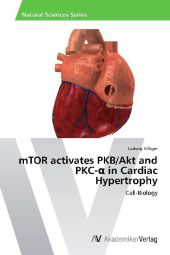 Neuerscheinungen 2013Stand: 2020-01-07 |
Schnellsuche
ISBN/Stichwort/Autor
|
Herderstraße 10
10625 Berlin
Tel.: 030 315 714 16
Fax 030 315 714 14
info@buchspektrum.de |

Ludwig Villiger
mTOR activates PKB/Akt and PKC- in Cardiac Hypertrophy
Cell-Biology
2013. 72 S. 220 mm
Verlag/Jahr: AV AKADEMIKERVERLAG 2013
ISBN: 3-639-45222-4 (3639452224)
Neue ISBN: 978-3-639-45222-8 (9783639452228)
Preis und Lieferzeit: Bitte klicken
Many people are suffering from cardiac hypertrophy, which can lead to heart failure. The numbers of patients, who are dying because of heart failure, are increasing. Therefore it is important to understand the underlying molecular mechanism of this disease. In cardiac hypertrophy the heart tries to catch up with the increased afterload by increasing the proteinbiosynthesis and cell growth making its ventricular walls thicker. In the beginning, the adaptation is physiological and reversible. This state is called compensated. But it can turn pathological, when the stress is too high and chronic, making the heart unable to fulfill its duty. In this decompensated state the heart fails to pump enough blood through the body, what can finally lead to congestive heart failure. Mammalian target of rapamycin (mTOR) is a key signaling molecule in cell growth and can be blocked by rapamycin. By blocking mTOR it could be possible that the hypertrophy of the heart can be blocked. The ideal case would be that only the pathological and not the physiological changes in the heart are blocked. In my study I investigated the signaling pathways of mTOR in relationship to cardiac hypertrophy.
Ludwig Villiger began his studies at the University of Basle in 2005. In 2008 he received the academic degree of Bachelor of Science in Molecular Biology from the Biozentrum. In the same year he began his Master study at the Cardiobiolgy Lab of Prof. Marijke Brink. In 2011 he completed his study with a Master of Science in Cell Biology.


